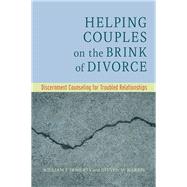This book presents a five-session protocol for distressed couples to learn about what has happened to their relationship and each person’s contributions to the problems, with the goal of clarifying a direction for their marriage.
Therapists and counselors can find themselves at an impasse when working with “mixed-agenda” couples—where one partner is considering divorce, while the other wants to preserve the marriage and start therapy. Such couples are a common and difficult challenge in clinical practice. To help confirm each partner’s agenda before taking decisive steps toward either reconciliation or divorce, this book presents a richly-illustrated protocol called discernment counseling, for helping couples understand what has happened to their relationship and each person’s contributions to the problems. The goal is to gain clarity and confidence about a direction for their marriage. Discernment counseling generally ends with a decision to divorce or a decision to engage in six months of couples therapy. Chapters cover special topics such as affairs and when one spouse has “fallen out of love” with the other.
Discernment counseling features individual conversations with the leaning-in and leaning-out spouse, along with carefully orchestrated times for each partner to share what they learned in the individual conversations. A special feature of the protocol is its short-term nature, with an initial commitment to just one session and a decision each time whether to do another session, up to five. This strategy invites both spouses to keep making choices to continue the work.
Therapists and counselors can find themselves at an impasse when working with “mixed-agenda” couples—where one partner is considering divorce, while the other wants to preserve the marriage and start therapy. Such couples are a common and difficult challenge in clinical practice. To help confirm each partner’s agenda before taking decisive steps toward either reconciliation or divorce, this book presents a richly-illustrated protocol called discernment counseling, for helping couples understand what has happened to their relationship and each person’s contributions to the problems. The goal is to gain clarity and confidence about a direction for their marriage. Discernment counseling generally ends with a decision to divorce or a decision to engage in six months of couples therapy. Chapters cover special topics such as affairs and when one spouse has “fallen out of love” with the other.
Discernment counseling features individual conversations with the leaning-in and leaning-out spouse, along with carefully orchestrated times for each partner to share what they learned in the individual conversations. A special feature of the protocol is its short-term nature, with an initial commitment to just one session and a decision each time whether to do another session, up to five. This strategy invites both spouses to keep making choices to continue the work.








